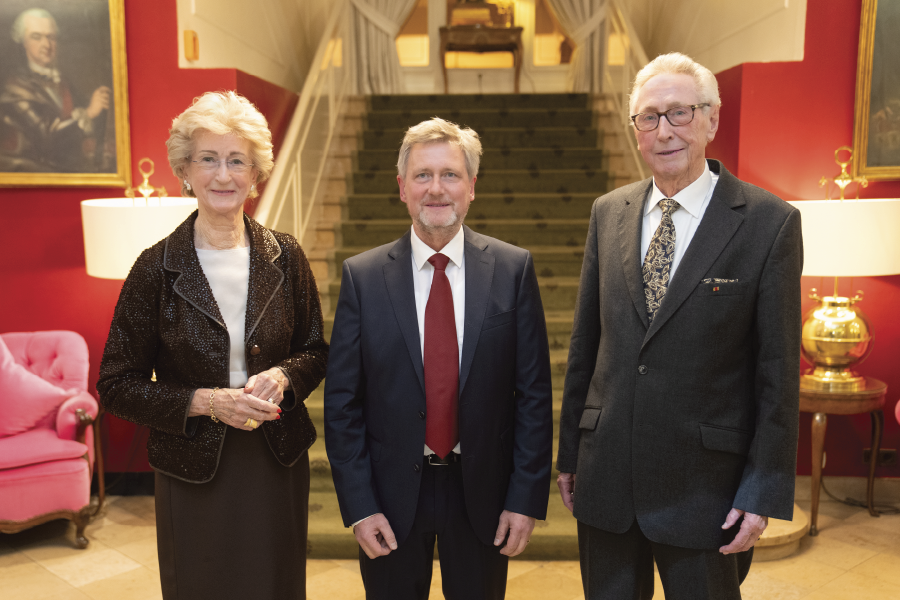Hector Science Award for Klaus-Robert Müller
The award recognizes professors for outstanding research and special commitment to teaching

Prof. Dr. Klaus-Robert Müller (middle) together with the two founders of the award, Josephine and Dr. h.c. Hans Werner Hector. Photo: Marco Schilling
Bernstein members involved: Klaus-Robert Müller
In 2024, the prestigious Hector Science Prize, endowed with 150,000 Euros, has been awarded to Klaus-Robert Müller, Professor at TU Berlin and Director of the Berlin Institute for the Foundations of Learning and Data (BIFOLD). The Hector Foundation, based in Weinheim, is dedicated to promoting education and research, art and culture, as well as health and welfare for socially disadvantaged people. The prize is granted to individual professors at German universities and research institutions for their outstanding research achievements and their special commitment to teaching and promoting young scientists.
“I am thrilled to receive the Hector Science Prize and to be able to join the ranks of the outstanding scientists who have received the prize before me,” said Klaus-Robert Müller on the occasion of the award ceremony in Heidelberg.
Klaus-Robert Müller has been a Professor of Machine Learning at TU Berlin since 2006. Together with his colleague Prof. Dr. Volker Markl (also at TU Berlin) he leads the Berlin Institute for the Foundations of Learning and Data (BIFOLD), one of six national AI centers in Germany, which has been granted permanent funding by the State of Berlin and the BMBF starting in 2022.
AI Applications for the Sciences
The jury of the Hector Foundation justified the award of the prize and admission to the Hector Fellow Academy by referring to Müller’s outstanding work in the field of machine learning methods in neurotechnology, pathology, and quantum chemistry: “In addition to these methodological contributions, Klaus-Robert Müller is distinguished by his high affinity for applications of this technology so essential to today’s science. With this, he has achieved significant advances or even breakthroughs in a wide range of disciplines,” the jury stated.
Klaus-Robert Müller’s fundamental research at the interface of machine learning and quantum mechanics has received worldwide attention. Some of the world’s greatest scientific challenges are associated with understanding systems of multiple interacting atoms over time. These include the formation of DNA in the genome, the effect of pharmaceuticals in the body, or the decomposition of harmful molecules in the atmosphere. All these interactions are governed by the laws of quantum mechanics. Understanding the spatial and temporal correlations of such quantum mechanical systems is an age-old dream of science. The most interesting properties of these systems do not result from the sum of the individual contributions of the atoms, but from complex electronic interactions. Because direct and accurate modeling of these complicated correlations exceeds existing computational capacities, large quantum systems have so far eluded mathematical simulation. A decade ago, however, an international team led by Klaus-Robert Müller developed a machine learning algorithm addressing this very problem, resulting in a 30 million-fold speed gain and opening up entirely new horizons in quantum chemistry.
AI in Medicine must be explainable
Another focus of Müller’s work has been the exploration of what is known as explainable AI. AI models have solved numerous challenging application problems in recent years. But how AI actually works – that is, how it arrives at the decisions it does – remains for the most part an incomprehensible ‘black box’ – even for the scientists involved. While this may seem insignificant in determining whether a picture shows a dog or a cat, how artificial intelligence reaches its conclusions takes on a whole new significance when applied to the use of AI in medicine or in autonomous driving.
In a 2019 study, Müller’s team showed that widely used AI methods in image recognition actually make their decisions based on the recognition of artefacts. One example of image recognition which became widely recognized in public circles was the algorithm trained on pictures of horses. Müller’s research team was able to prove that in recognizing the horse, the algorithm did not in fact focus on the animal’s features (such as four legs, mane, or head shape), but rather on an invisible script that read “horse pictures” found at the bottom of the majority of the training images.
In various fundamental works on explainable AI, Klaus-Robert Müller and his team have developed diverse methods making it possible to trace back and explain, understand, and trust the decisions of an AI. Some of these AI methods have found an almost immediate application in digital histopathology – another research focus of Klaus-Robert Müller.




